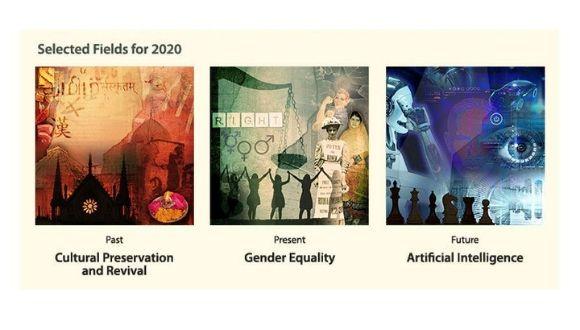מוזמנים להגיש מועמדות לפרס ע"ש דן דוד
אוניברסיטת תל אביב בשיתוף קרן דן דוד יחלקו בשנת 2020 שלושה פרסים, כל אחד בסך מיליון דולר. היכנסו ובדקו מהם התחומי המחקר המועמדים לזכייה
The Dan David Prize
is an international prize which annually awards three prizes of US$ 1 million each for achievements having an outstanding scientific, technological, cultural or social impact on our world. Each year fields are chosen
within the three Time Dimensions - Past, Present and Future
Selected Fields 2020
Future - Artificial Intelligence
The field of Artificial Intelligence has the ambitious goal of building machines that can mimic aspects of human behavior such as learning, reasoning, perception and movement.
Achieving this goal can dramatically change modern society, for example by reducing risk to humans via autonomous vehicles, improving healthcare via automated diagnostics, and making new scientific discoveries by applying AI to large amounts of data.
In recent years we have witnessed dramatic progress in this field, with machines matching or out-performing humans in several tasks. Extensive research efforts are ongoing to reduce the large gap that remains between what humans and computers can achieve.
The development of AI heralds a new era for humanity, one that brings with it a promise of extraordinary advancements, but also serious challenges from the ethical, social and economic point of view.
The 2019 Dan David Prize for the Future Time Dimension in the field of Artificial Intelligence will be awarded to an outstanding individual or individuals who have made a groundbreaking, significant contribution to advancing Artificial Intelligence for the benefit of humanity and who continue to pioneer this field.
Present - Gender Equality
The struggle for gender equality in the last two centuries has led to one of the most astonishing and effective societal transformations humanity has seen. Early feminists and their supporters struggled for women’s right to vote, to own property and engage in market transactions, to seek divorce and child custody, to receive equal pay – in other words, to be treated as full human beings in all spheres of life. What seemed unimaginable then is formally the reality for most women around the world today.
Yet the struggle is far from complete. Some campaigns benefited certain groups while leaving other women behind, calling attention to intersectionality and class dynamics. Moreover, the male-female binary that motivates feminist thought has come into question, drawing attention to the differences between groups of women, and to the impact on other gender minorities. At the same time, a glaring disparity between the formal equality of women and their lived realities, remains. Women still disproportionately endure sexual and domestic violence, workplace and pay discrimination and a greater burden of household care work. They are unequally represented in leadership positions and overly represented under the poverty line. And in communities following traditional orthodoxies, women are still subject to extreme forms of discrimination, subjugation and mutilation. These challenges have become more evident in the age of technological developments - that enabled movements such as #MeToo – and of globalization, which has enhanced questions of global and local power disparities. Feminists are thus called upon to develop new tools, methods, theories and strategies to respond to the different challenges.
The 2020 Dan David Prize in the Present Time Dimension will be awarded to an outstanding individual or organization whose achievements are making a significant impact in the ongoing complex, multifaceted struggle for gender equality.
Past - Cultural Preservation and Revival
Culture constitutes a foundational cornerstone of every society. It includes traditions, beliefs, rituals, artistic expressions, philosophies, mythologies, languages and more. It is dynamic, vibrant and in constant dialogue with society.
This fragile and impermanent heritage can sometimes fade or even disappear. Indeed, some cultures have ceased to exist due to social or political upheavals that brought about their extinction. Many groups and institutions since the dawn of civilization have engaged in the preservation and revival of their cultures. Museums, libraries and universities have been at the forefront of preserving cultures in modern times.
Reviving cultures has become common as a means to promote social ideas and weigh in on debates, from protecting minorities and promoting social justice to building nations and preserving traditional power structures.
With the accelerated pace of change in the global arena over recent decades – expediting the emergence of new cultures and the disappearance of old ones – the practice of cultural preservation and revival has become an even more important for humanity.
The 2020 Dan David Prize in the Past Time Dimension will be awarded to an outstanding individual or organization who is making an ongoing, groundbreaking contribution to cultural preservation or revival through research, conservation efforts or direct activity in the field.








